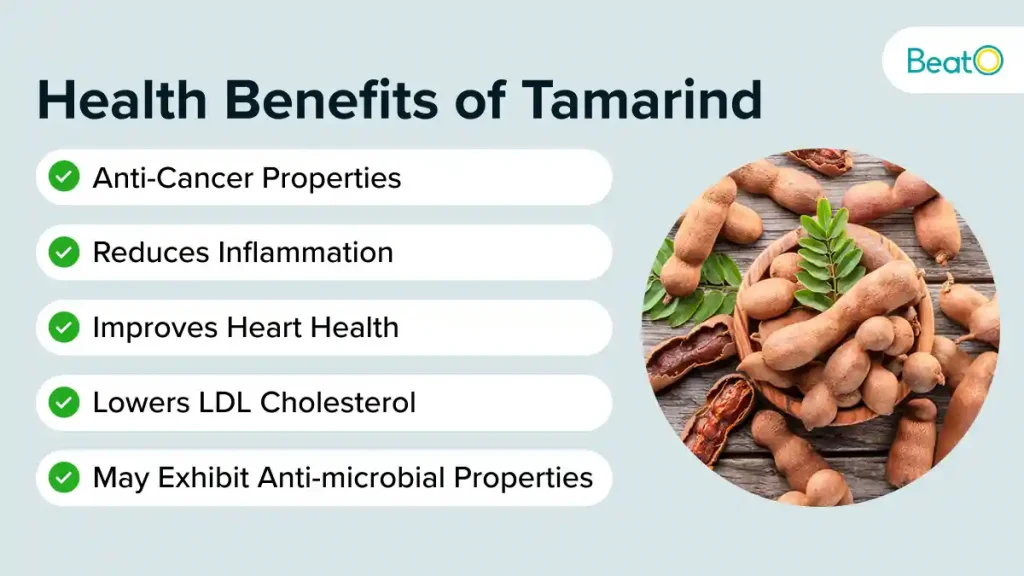Tamarind is a tropical fruit that is a nutrient powerhouse with a unique sweet and sour flavour. It is scientifically known as Tamarindus indica L. and belongs to the Leguminosae (Fabaceae). It originated in Africa but is grown in the tropical regions of India. In addition, tamarind is used in culinary delights in Asian, Mexican and Caribbean dishes. It can be used as a paste or a puree. Moreover, tamarind benefits include improving heart health, aiding in weight loss and regulating blood sugar levels. Let’s explore the several health benefits of tamarind, making it a must-have in your diet.

Also read: 7 Strawberry Benefits You Need To Know
Nutritional Overview Of Tamarind
| Nutrient | Nutritional Value Per 100g |
|---|---|
| Calories | 239kcal |
| Total Fat | 0.6g |
| Protein | 2.8g |
| Carbohydrates | 62.5g |
| Sugar | 38.8g |
| Fiber | 6g |
| Calcium | 74mg |
| Iron | 2.8mg |
| Magnesium | 92mg |
| Phosphorus | 113mg |
| Potassium | 628mg |
| Sodium | 28mg |
Also read: 7 Amazing Peach Benefits For Good Heart And Gut Health
Different Types Of Tamarind
Pressed block: This is a form of tamarind without seeds and shells; these are removed, and the remaining pulp is compressed into a block.
Concentrate: Concentrated tamarind is a pulp that has been boiled and cooled down. In addition, preservatives may be added to preserve it for longer.
Raw pods: This is the least processed form of tamarind. The pods are attached, and the pulp can be easily removed.
Also read:15 Benefits of Eating Raw Onion You Must Know About
Health Benefits Of Tamarind

Improves Heart Health
Well, tamarinds are loaded with potassium and several heart-healthy compounds. The pulp is also a great source of potassium. It also helps control heart rate and blood pressure by counteracting the effects of sodium.
May Exhibit Anti-microbial Properties
Tamarinds also exhibit antifungal, antibacterial, and antiviral properties. Moreover, lupeol is a natural triterpenoid with antibacterial properties.
Anti-Cancer Properties
Tamarinds are loaded with antioxidants, which have potential health benefits. These antioxidants are beneficial for various health conditions, including cancer.
Good For Skin
Tamarind is loaded with Vitamin C and Vitamin A, which help exfoliate dead skin cells, revealing a brighter complexion. In addition, it helps in healing wounds and scars quickly. The fruit’s antimicrobial properties help combat acne-causing bacteria, and its vitamin C content aids in collagen production, reducing signs of ageing.
Lowers LDL Cholesterol
Tamarinds also lower LDL cholesterol. But how? Yes, they are loaded with antioxidants and saponins that lower LDL cholesterol and reduce the risks of developing heart-related disorders. In addition, they contain carotene to reduce bad cholesterol.
Reduces Inflammation
Tamarinds offer anti-inflammatory properties that help to inhibit various inflammatory responses. But how does it work? So, tamarinds activate opioid receptors. In addition, this is great fruit for treating various inflammatory conditions such as arthritis, stomach pain, and sore throat.
Is Tamarind Good For Diabetes?
Research has suggested that tamarind is definitely a good option for people with diabetes. Its glycemic index (GI) is less than 55, making it a great choice to add to your diet. Moreover, the polyphenols present in tamarind have shown anti-inflammatory and glucose-lowering effects. Also, It improves blood sugar regulation in people with diabetes. In addition, tamarind has shown effects on people with diabetes by improving insulin sensitivity and reducing insulin resistance.
Also read:12 Best Fat Burning Foods To Help You Lose Weight
How to Incorporate Tamarind into Your Diet
Tamarind can be consumed in various forms, including raw pods, paste, concentrate, and juice. Here are some delicious ways to add tamarind to your diet:
- Soups and Stews: Add tamarind paste to soups and stews for a unique sour taste.
- Chutneys and Sauces: Chutneys are a popular condiment in India. They add a tangy flavour to dishes, and people love to eat them.
- Marinades: Use tamarind paste in marinades for meat and fish to enhance flavour and tenderness.
- Beverages: Tamarind juice is one of the most refreshing drinks, often mixed with sugar and spices.
- Desserts: Last but not least, tamarind is used in candies and desserts for a sweet and sour twist.
In The End
Tamarind benefits include lowering LDL cholesterol, reducing inflammation, and improving heart health. This versatile fruit has a rich nutritional profile and offers various health benefits. It is also a natural remedy that has been cherished for centuries. So, try to incorporate tamarind into your diet to reap the maximum benefits of its many health benefits and enjoy its unique flavour.
Disclaimer: The content of this article is compiled information from generic and public sources. It is in no way a substitute, suggestion, or advice for a qualified medical opinion. Always consult a specialist or your own doctor for more information. Beato App does not claim responsibility for this information.
Are you looking for the perfect glucometer to check your blood sugar level? Try out BeatO smartglucometerkit, affordable and easy to use.
Discover top-tier diabetes care with BeatO’s Chief Clinical Officer,Dr. Navneet Agarwal. His expertise in Diabetes ensures personalised guidance for overall health. Try out a smartglucometerand keep track of blood sugar levels now.




